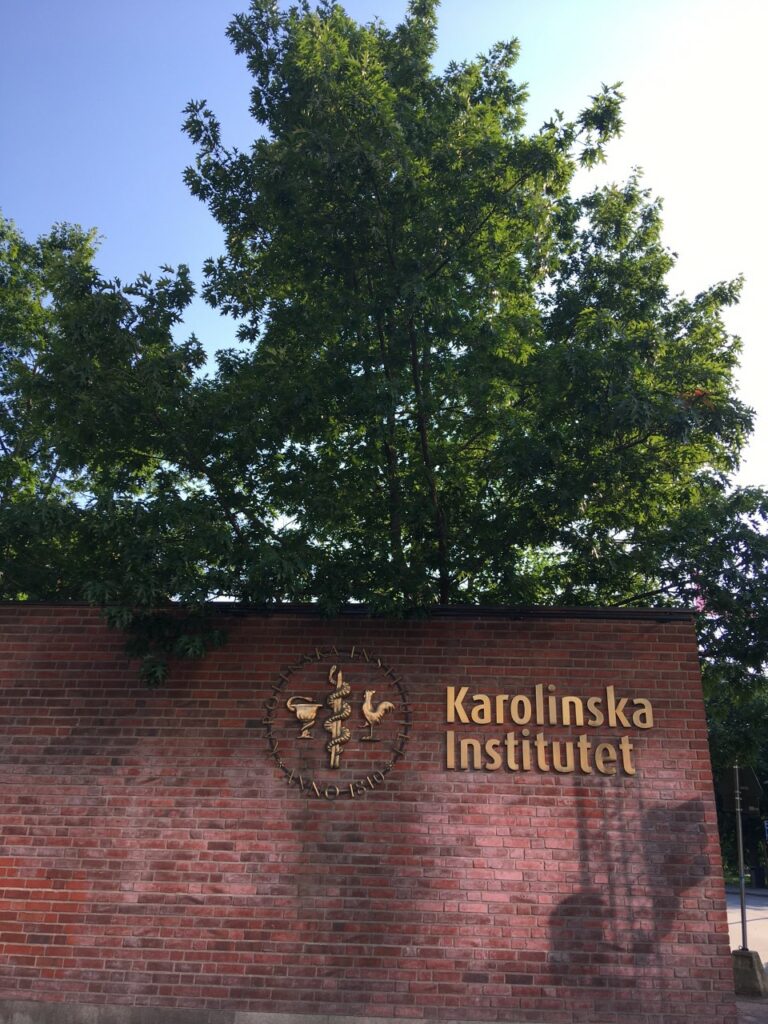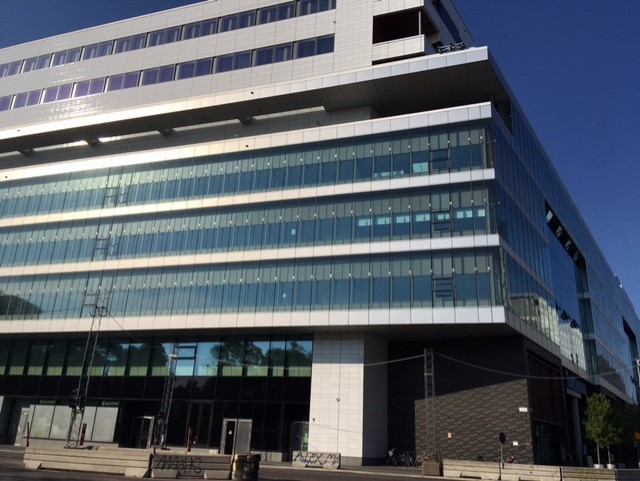北欧绿色邮报网报道(记者陈雪霏)– 诺贝尔医学奖评奖单位卡罗琳斯卡医学院的最新研究表明婴儿出生的最初几个月对免疫力的提升有重要作用。

研究表明婴儿出生后母乳喂养对婴儿的免疫力产生有重要影响。婴儿最初这几个月的成长对日后的抵抗力例如,过敏,哮喘等疾病都有重要影响。母乳喂养,有益菌和免疫系统的发展之间是有关联的。
要想防止日后的过敏或哮喘和缺乏免疫力等问题,就是要帮助免疫系统建立一个规范机制。卡罗琳斯卡妇女儿童健康部儿科医生和研究员彼得.布鲁丁说。
研究表明哮喘在发展中国家反而没有那么多。过敏哮喘可能和用抗生素太早有关。而母乳喂养的儿童容易形成很好的代谢循环系统和免疫系统。

本次研究是通过对208个母乳喂养的儿童进行研究的结果。时间是2014年到2019年。
研究人员认为该研究成果可能对哮喘等其他疾病也可能发现新的对策。
Many diseases caused by a dysregulated immune system, such as allergies, asthma and autoimmunity, can be traced back to events in the first few months after birth. To date, the mechanisms behind the development of the immune system have not been fully understood. Now, researchers at Karolinska Institutet show a connection between breast milk, beneficial gut bacteria and the development of the immune system. The study is published in Cell.
“A possible application of our results is a preventative method for reducing the risk of allergies, asthma and autoimmune disease later in life by helping the immune system to establish its regulatory mechanisms,” says the paper’s last author Petter Brodin, paediatrician and researcher at the Department of Women’s and Children’s Health, Karolinska Institutet. “We also believe that certain mechanisms that the study identifies can eventually lead to other types of treatment for such diseases, not just a prophylactic.”
The incidence of autoimmune diseases such as asthma, type 1 diabetes and Crohn’s disease is increasing in children and adolescents in parts of the world. These diseases are debilitating, but not as common in low-income countries as they are in Europe and the USA.
It has long been known that the risk of developing these diseases is largely determined by early life events; for instance, there is a correlation between the early use of antibiotics and a higher risk of asthma. It is also known that breastfeeding protects against most of these disorders.
There is a link between specific, protective bacteria on the skin and in the airways and gut and a lower risk of immunological diseases. However, there is still much to learn about how these bacteria form the immune system.
Researchers at Karolinska Institutet, Evolve Biosystems, Inc, the University of California Davis, University of Nebraska, Lincoln, and University of Nevada, Reno studied how the neonatal immune system adapts to and is shaped by the many bacteria, viruses, nutrients and other environmental factors to which the baby is exposed during the first few months of life.
Earlier research has shown that bifidobacteria are common in breastfed babies in countries with a low incidence of autoimmune diseases.
Breast milk is rich in HMOs (Human milk oligosaccharides), which babies are unable to metabolise on their own. The production of these complex sugars are instead associated with the evolutionary advantage of nourishing specific gut bacteria that play an important part in their immune system. Bifidobacteria are one such bacterial class.
“We found that babies whose intestinal flora can break down HMOs have less inflammation in the blood and gut,” says professor Brodin. “This is probably because of the uniquely good ability of the bifidobacteria to break down HMOs, to expand in nursing babies and to have a beneficial effect on the developing immune system early in life.”
Babies who were breastfed and received additional bifidobacteria had higher intestinal levels of the molecules ILA and Galectin-1. ILA (indole-3-lactic acid) is needed to convert HMO molecules into nutrition; Galectin-1 is central to the activation of the immune response to threats and attacks.
According to the researchers, Galectin-1 is a newly discovered and critical mechanism for preserving bacteria with beneficial, anti-inflammatory properties in the intestinal flora.
The results are based on 208 breastfed babies born at Karolinska University Hospital between 2014 and 2019. The researchers also used novel methods to analyse the immune system even from small blood samples. Additionally, a second cohort developed by the University of California in which infants were exclusively breastfed and half were fed B. infantis supplement were analyzed for enteric inflammation.
One limitation of the study is that the researchers were unable to study the immune system direct in the gut and had to resort to blood samples. Not all aspects of the gut immune system can be seen in the blood, but it is not ethically defensible to take intestinal biopsies from healthy neonates.
The researchers now hope to follow the participant babies for a longer time to see which ones develop atopic eczema, asthma and allergies.
“We’re planning a new experiment using bacterial substitution to see if we can help all babies have a healthier immunological start in life,” says professor Brodin. “We’re also working with other researchers to compare the development of the immune system in Swedish babies with babies who grow up in rural sub-Saharan Africa, where the incidence of allergies is much lower.”
The study was financed by the European Research Council, the Knut and Alice Wallenberg Foundation, Karolinska Institutet and Swedish Research Council.
Petter Brodin, Axel Olin, Jaromir Mikes and Tadepally Lakshmikanth are the founders of Cytodelics AB, Sweden. Petter Brodin is advisor to Scailyte AG, Switzerland. Ryan D. Mitchell, Stephanie Chew, Johann Prambs, Heather K. Brown, Steven A. Frese and Bethany M. Henrick are employed by Evolve BioSystems. Jennifer T. Smilowitz has received a grant for the IMPRINT experiment and Amy M. Ehrlich received funding for assisting with the writing of the manuscript. Bruce J. German is co-founder of Evolve BioSystems. Steven A. Frese are Bethany M. Henrick are affiliated with the Department of Food Science and Technology, University of Nebraska-Lincoln, USA.
Publication: “Bifidobacteria-mediated immune system imprinting early in life”. Bethany M. Henrick, Lucie Rodriguez, Tadepally Lakshmikanth, Christian Pou, Ewa Henckel, Aron Arzoomand, Axel Olin, Jun Wang, Jaromir Mikes, Ziyang Tan, Yang Chen, Amy M. Ehrlich, Anna Karin Bernhardsson, Constantin Habimana Mugabo, Ylva Ambrosiani, Anna Gustafsson, Stephanie Chew, Heather K. Brown, Johann Prambs, Kajsa Bohlin, Ryan D. Mitchell, Mark A. Underwood, T. Smilowitz, Bruce J. German, Steven A. Frese, Petter Brodin. Cell, 17 June 2021, doi:10.1016/j.cell.2021.05.030.
Editor Xuefei Chen Axelsson.EditFirst months decisive for immune system development
Post navigation
British PM says it doesn’t look like COVID-19 leaked from Chinese lab
By Chinaeuropenet
Xuefei Chen Axelsson is an independent media person. She has been a journalist for 30 years. She studied English, International politics, and sustainable development. She has been to Zimbabwe, Mozambique, Namibia and South Africa, Australia, New Zealand and America, Canada, France, Germany, Spain and all the nordic countries including Sweden, Finland, Denmark, Norway, Iceland and Britain. She is good at talking with all kinds of people and exchange ideas and serves as a bridge between China and the world.
RELATED POST
British PM says it doesn’t look like COVID-19 leaked from Chinese lab
JUN 16, 2021 CHINAEUROPENETEditSCI-TECH
First months decisive for immune system development June 19, 2021
